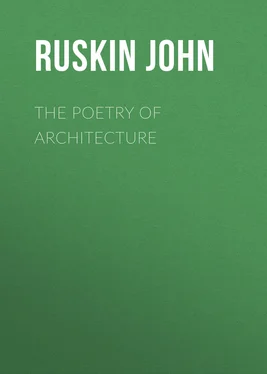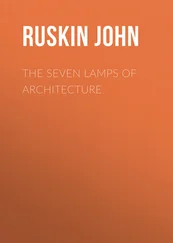John Ruskin - The Poetry of Architecture
Здесь есть возможность читать онлайн «John Ruskin - The Poetry of Architecture» — ознакомительный отрывок электронной книги совершенно бесплатно, а после прочтения отрывка купить полную версию. В некоторых случаях можно слушать аудио, скачать через торрент в формате fb2 и присутствует краткое содержание. Жанр: foreign_antique, foreign_home, literature_19, visual_arts, на английском языке. Описание произведения, (предисловие) а так же отзывы посетителей доступны на портале библиотеки ЛибКат.
- Название:The Poetry of Architecture
- Автор:
- Жанр:
- Год:неизвестен
- ISBN:нет данных
- Рейтинг книги:5 / 5. Голосов: 1
-
Избранное:Добавить в избранное
- Отзывы:
-
Ваша оценка:
- 100
- 1
- 2
- 3
- 4
- 5
The Poetry of Architecture: краткое содержание, описание и аннотация
Предлагаем к чтению аннотацию, описание, краткое содержание или предисловие (зависит от того, что написал сам автор книги «The Poetry of Architecture»). Если вы не нашли необходимую информацию о книге — напишите в комментариях, мы постараемся отыскать её.
The Poetry of Architecture — читать онлайн ознакомительный отрывок
Ниже представлен текст книги, разбитый по страницам. Система сохранения места последней прочитанной страницы, позволяет с удобством читать онлайн бесплатно книгу «The Poetry of Architecture», без необходимости каждый раз заново искать на чём Вы остановились. Поставьте закладку, и сможете в любой момент перейти на страницу, на которой закончили чтение.
Интервал:
Закладка:
John Ruskin
The Poetry of Architecture / Or, the Architecture of the Nations of Europe Considered in its Association with Natural Scenery and National Character
PREFATORY NOTES
Of this work Mr. Ruskin says in his Autobiography:—"The idea had come into my head in the summer of '37, and, I imagine, rose immediately out of my sense of the contrast between the cottages of Westmoreland and those of Italy. Anyhow, the November number of Loudon's Architectural Magazine for 1837 opens with 'Introduction to the Poetry of Architecture; or the Architecture of the Nations of Europe considered in its Association with Natural Scenery and National Character,' by Kata Phusin. I could not have put in fewer, or more inclusive words, the definition of what half my future life was to be spent in discoursing of; while the nom-de-plume I chose, 'According to Nature,' was equally expressive of the temper in which I was to discourse alike on that, and every other subject. The adoption of a nom-de-plume at all implied (as also the concealment of name on the first publication of 'Modern Painters') a sense of a power of judgment in myself, which it would not have been becoming in a youth of eighteen to claim...."
"As it is, these youthful essays, though deformed by assumption, and shallow in contents, are curiously right up to the points they reach; and already distinguished above most of the literature of the time, for the skill of language, which the public at once felt for a pleasant gift in me." ( Præterita , vol. I. chap. 12.)
In a paper on "My First Editor," written in 1878, Mr. Ruskin says of these essays that they "contain sentences nearly as well put together as any I have done since."
The Conductor of the Architectural Magazine in reviewing the year's work said (December, 1838):—"One series of papers, commenced in the last volume and concluded in the present one, we consider to be of particular value to the young architect. We allude to the 'Essays on the Poetry of Architecture,' by Kata Phusin. These essays will afford little pleasure to the mere builder, or to the architect who has no principle of guidance but precedent; but for such readers they were never intended. They are addressed to the young and unprejudiced artist; and their great object is to induce him to think and to exercise his reason.... There are some, we trust, of the rising generation, who are able to free themselves from the trammels and architectural bigotry of Vitruvius and his followers; and it is to such alone that we look forward for any real improvement in architecture as an art of design and taste."
The essays are in two parts: the first describing the cottages of England, France, Switzerland, and Italy, and giving hints and directions for picturesque cottage-building. The second part treats of the villas of Italy and England—with special reference to Como and Windermere; and concludes with a discussion of the laws of artistic composition, and practical suggestions of interest to the builders of country-houses.
It was the Author's original intention to have proceeded from the cottage and the villa to the higher forms of Architecture; but the Magazine to which he contributed was brought to a close shortly after the completion of his chapters on the villa, and his promise of farther studies was not redeemed until ten years later, by the publication of The Seven Lamps of Architecture , and still more completely in The Stones of Venice .
Other papers contributed by Mr. Ruskin to the same Magazine, on Perspective, and on the proposed monument to Sir Walter Scott at Edinburgh, are not included in this volume, as they do not form any part of the series on the Poetry of Architecture.
The text is carefully reprinted from the Architectural Magazine . A few additional notes are distinguished by square brackets.
A few of the old cuts, necessary to the text, are reproduced, and some are replaced by engravings from sketches by the Author. Possessors of the Architectural Magazine , vol. V., will be interested in comparing the wood-cut of the cottage in Val d'Aosta (p. 104 of that volume) with the photogravure from the original pencil drawing, which faces p. 21of this work. It is much to be regretted that the original of the Coniston Hall ( fig. 8; p. 50of this work) has disappeared, and that the Author's youthful record of a scene so familiar to him in later years should be represented only by the harsh lines of Mr. Loudon's engraver.
THE EDITOR.INTRODUCTION
1. The Science of Architecture, followed out to its full extent, is one of the noblest of those which have reference only to the creations of human minds. It is not merely a science of the rule and compass, it does not consist only in the observation of just rule, or of fair proportion: it is, or ought to be, a science of feeling more than of rule, a ministry to the mind, more than to the eye. If we consider how much less the beauty and majesty of a building depend upon its pleasing certain prejudices of the eye, than upon its rousing certain trains of meditation in the mind, it will show in a moment how many intricate questions of feeling are involved in the raising of an edifice; it will convince us of the truth of a proposition, which might at first have appeared startling, that no man can be an architect, who is not a metaphysician.
2. To the illustration of the department of this noble science which may be designated the Poetry of Architecture, this and some future articles will be dedicated. It is this peculiarity of the art which constitutes its nationality; and it will be found as interesting as it is useful, to trace in the distinctive characters of the architecture of nations, not only its adaptation to the situation and climate in which it has arisen, but its strong similarity to, and connection with, the prevailing turn of mind by which the nation who first employed it is distinguished.
3. I consider the task I have imposed upon myself the more necessary, because this department of the science, perhaps regarded by some who have no ideas beyond stone and mortar as chimerical, and by others who think nothing necessary but truth and proportion as useless, is at a miserably low ebb in England. And what is the consequence? We have Corinthian columns placed beside pilasters of no order at all, surmounted by monstrosified pepper-boxes, Gothic in form and Grecian in detail, in a building nominally and peculiarly "National"; we have Swiss cottages, falsely and calumniously so entitled, dropped in the brick-fields round the metropolis; and we have staring square-windowed, flat-roofed gentlemen's seats, of the lath and plaster, mock-magnificent, Regent's Park description, rising on the woody promontories of Derwentwater.
4. How deeply is it to be regretted, how much is it to be wondered at, that, in a country whose school of painting, though degraded by its system of meretricious coloring, and disgraced by hosts of would-be imitators of inimitable individuals, is yet raised by the distinguished talent of those individuals to a place of well-deserved honor; and the studios of whose sculptors are filled with designs of the most pure simplicity, and most perfect animation; the school of architecture should be so miserably debased!
5. There are, however, many reasons for a fact so lamentable. In the first place, the patrons of architecture (I am speaking of all classes of buildings, from the lowest to the highest), are a more numerous and less capable class than those of painting. The general public, and I say it with sorrow, because I know it from observation, have little to do with the encouragement of the school of painting, beyond the power which they unquestionably possess, and unmercifully use, of compelling our artists to substitute glare for beauty. Observe the direction of public taste at any of our exhibitions. We see visitors at that of the Society of Painters in Water Colors, passing Tayler with anathemas and Lewis with indifference, to remain in reverence and admiration before certain amiable white lambs and water-lilies, whose artists shall be nameless. We see them, in the Royal Academy, passing by Wilkie, Turner and Callcott, with shrugs of doubt or of scorn, to fix in gazing and enthusiastic crowds upon kettles-full of witches, and His Majesty's ships so and so lying to in a gale, etc., etc. But these pictures attain no celebrity because the public admire them, for it is not to the public that the judgment is intrusted. It is by the chosen few, by our nobility and men of taste and talent, that the decision is made, the fame bestowed, and the artist encouraged.
Читать дальшеИнтервал:
Закладка:
Похожие книги на «The Poetry of Architecture»
Представляем Вашему вниманию похожие книги на «The Poetry of Architecture» списком для выбора. Мы отобрали схожую по названию и смыслу литературу в надежде предоставить читателям больше вариантов отыскать новые, интересные, ещё непрочитанные произведения.
Обсуждение, отзывы о книге «The Poetry of Architecture» и просто собственные мнения читателей. Оставьте ваши комментарии, напишите, что Вы думаете о произведении, его смысле или главных героях. Укажите что конкретно понравилось, а что нет, и почему Вы так считаете.












